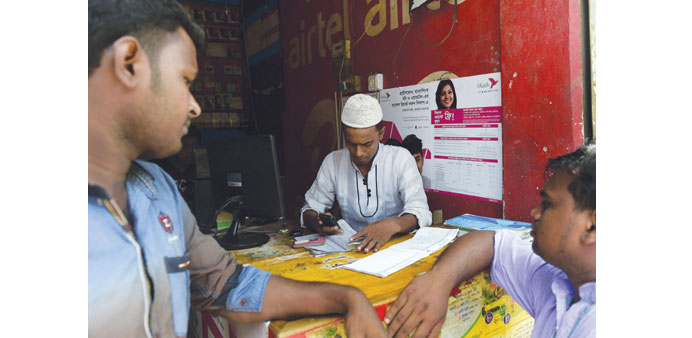AFP
Dhaka
For Rehana Akhter, rebuilding her life after losing her leg in Bangladesh’s worst industrial disaster is an uphill battle, but her struggle is eased slightly by digital technology.
The 25-year-old has an electronic bank account on her mobile, giving her access to financial services that have traditionally been out of reach for millions of poor in Bangladesh and other developing nations.
From the capital Dhaka, Akhter sends interest earned on her 1mn taka ($12,820) compensation from the disaster quickly and cheaply to her 10-year-old son and parents back in their village.
“Life is tough for anyone who’s lost a limb. Nobody gives you a job or cares about your pain,” she said of her injuries suffered in the Rana Plaza garment factory complex collapse that killed more than 1,100
people in 2013.
“But the pain is partly relieved when you know that there are technologies to help you.”
Started in 2011 by a local company called bKash, the electronic banking service has since exploded in popularity to become one of the world’s largest, with 17mn registered accounts.
Bangladesh has been the heartland of microfinance thanks to the pioneering efforts of Nobel Prize winner Muhammad Yunus, whose small loans empowered millions of poor.
But the bKash Wallet service has reached further, allowing anyone with a mobile phone to receive wages, send remittances and pay bills for a fee of less than 2% of the transaction.
As bKash has grown, a string of banks that have traditionally snubbed the poor have started similar services, with an estimated 22% of Bangladesh adults now using mobile money.
“bKash has emerged as a very efficient payment arrangement with endless possibilities,” its MIT-educated chief executive Kamal Quadir said.
“It’s a completely new payment infrastructure that has access to the country’s rich and poor.”
Quadir credited its success to its low cost and huge reach — about 100,000 bKash agents such as shopkeepers are employed in villages throughout the country allowing receivers of electronic money to get their cash.
“Anybody with a very basic phone can transfer money anywhere in the country. You don’t need a fancy phone. A $15 phone is good enough.”
The Bill and Melinda Gates Foundation has invested an undisclosed amount in bKash, a subsidiary of a local bank.
Like millions of other Bangladeshis, Akhter was forced to leave her village years ago, in the western border district of Jessore, to find work in one of the country’s thousands of garment factories.
But physically sending money back home was costly and often fraught with danger, resulting in arguments with family members.
“In the past, there were times I sent money through my brother and once he never paid my son,” she said at Savar, outside the capital, where she has been looking for a new job.
“Then I used to send money through courier services. But it took a day for the money to reach my family.”
A survey of rickshaw pullers last year in Dhaka showed 95% used the service for remittances, instead of giving their cash to expensive and slow couriers who ply the congested, pot-holed roads.
“It’s a huge breakthrough in inclusive banking,” said social scientist Salahuddin Aminuzzaman, from Dhaka University, who conducted the survey.
“What we’ve found is that the mobile financial service has emerged as a big tool for savings and empowerment,” he said.
“It’s empowered millions of women garment workers who would otherwise depend on male relatives to carry their
income back to villages.”
The poor worldwide have long lacked access to traditional services especially in rural areas where banks consider building bricks-and-mortar offices uneconomical.
But nearly two dozen banks in Bangladesh have now developed the service since bKash, with monthly transfers topping $1.6bn in March, up about 12% from February, according to the central bank.
Monthly utility payments made using bKash rose a whopping 62% during the same period as consumers turned to the mobile method, considered more efficient than waiting in queues.
“The impact is revolutionary. Now an agent of a mobile phone service can operate like a one-man bank branch, offering all sorts of services that a bank normally offers,” central bank spokesman A F M Asaduzzaman said.
Thousands of shops and other retailers are also making and accepting payments using the service.
Ahamad Ali, a garment shop owner some 200km (124 miles) west of Dhaka, hailed bKash as a “godsend” after years spent carrying cash to buy clothes from wholesalers and running the gauntlet of criminals.
“In just one year, my shop’s sales through bKash has grown by more than 10% and our payments
to cloth makers by 20%.”
“It saves you valuable time and cuts the risk of being robbed.”

